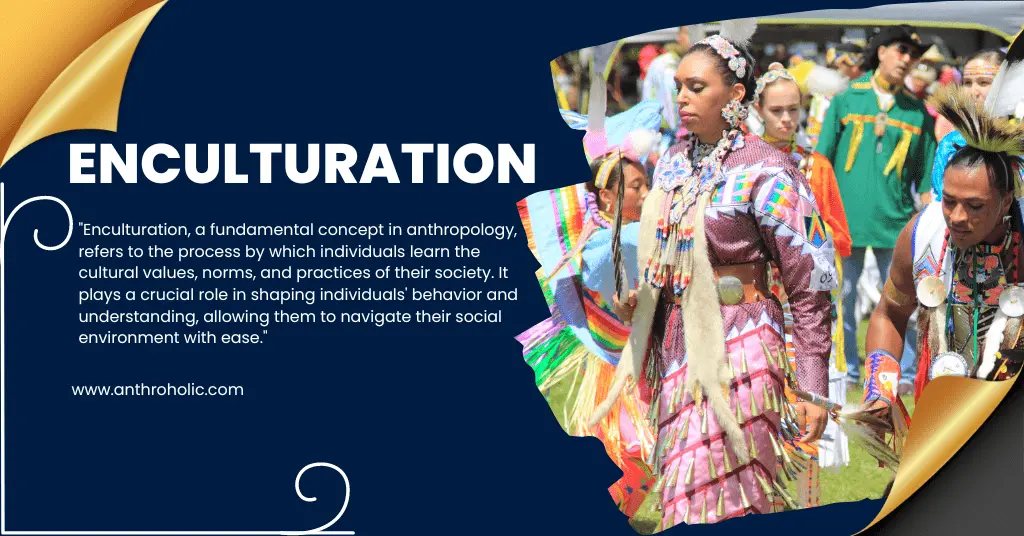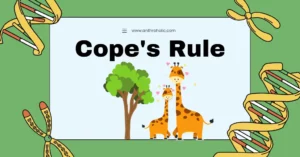Enculturation
Enculturation, a fundamental concept in anthropology, refers to the process by which individuals learn the cultural values, norms, and practices of their society. It plays a crucial role in shaping individuals’ behavior and understanding, allowing them to navigate their social environment with ease. In this article, we will explore the origins of the term, discuss how enculturation occurs, and examine famous case studies backed by fieldwork from renowned anthropologists.

What is Enculturation?
Enculturation is the process through which individuals acquire the knowledge, values, and behaviors of their culture. It is an ongoing, lifelong process that enables individuals to become functioning members of their society (Schwartz, 2018). Enculturation is essential for transmitting cultural practices and beliefs from one generation to the next, ensuring the continuity of cultural identity and knowledge.
Origin of the Word
The term “enculturation” can be traced back to American anthropologist Melville J. Herskovits, who first used it in his 1948 book, “Man and His Works: The Science of Cultural Anthropology” (Herskovits, 1948). The word is derived from the Latin prefix “en-” meaning “in” or “within,” and the noun “culture.” It signifies the process by which individuals are immersed in their culture, absorbing its values and beliefs.
How Enculturation Occurs?
Enculturation occurs through various channels, such as socialization, observation, and imitation. The following are some primary ways enculturation takes place:
- Socialization: Socialization is the process through which individuals learn the norms, values, and practices of their society. It is facilitated by interaction with family members, peers, and institutions such as schools, religious organizations, and the media (O’Neil, 2009).
- Observation and imitation: Individuals learn by observing the behavior of others in their social environment. They then imitate these behaviors, gradually internalizing the cultural norms and values (Bandura, 1977).
- Language acquisition: Learning a language is an essential part of enculturation, as language reflects and shapes cultural values and beliefs. Through language, individuals learn the cultural meanings and practices associated with different words and concepts (Sapir, 1921; Whorf, 1956).
- Rituals and ceremonies: Cultural rituals and ceremonies are essential avenues for transmitting cultural knowledge and reinforcing cultural identity. By participating in these events, individuals internalize the cultural values and beliefs associated with them (Turner, 1969).
Famous Case Studies in Enculturation
- Margaret Mead’s Coming of Age in Samoa (1928): Mead conducted fieldwork in Samoa, studying the enculturation process of adolescent girls. Her research suggested that the socialization process in Samoan culture led to a more relaxed and less stressful transition to adulthood compared to Western societies (Mead, 1928).
- Bronislaw Malinowski’s Argonauts of the Western Pacific (1922): Malinowski’s pioneering ethnographic study among the Trobriand Islanders of Papua New Guinea provided insights into the enculturation process by examining the complex social relationships and exchanges involved in the Kula Ring, a ceremonial exchange system (Malinowski, 1922).
- Nancy Scheper-Hughes’ Death Without Weeping (1992): Scheper-Hughes conducted fieldwork in a Brazilian shantytown, documenting the high infant mortality rate and the community’s response to it. She argued that the enculturation process shaped the mothers’ emotional response to their children’s deaths, allowing them to cope with the tragic reality of their lives (Scheper-Hughes, 1992).
- E.E. Evans-Pritchard’s The Nuer (1940): Evans-Pritchard studied the Nuer people of Sudan, focusing on their social organization, political structure, and enculturation process. He demonstrated how the Nuer’s cultural beliefs and practices shaped their political organization and kinship system (Evans-Pritchard, 1940).
Conclusion
Enculturation is a vital process that allows individuals to acquire the cultural knowledge, values, and practices necessary to function effectively within their societies. By understanding the origins of the term and exploring various ways enculturation occurs, we can better appreciate the significance of this process. Additionally, examining famous case studies by renowned anthropologists provides valuable insights into how enculturation shapes human behavior and understanding across diverse cultures.
Works Cited
- Bandura, Albert. “Social Learning Theory.” General Learning Press, 1977.
- Evans-Pritchard, E.E. “The Nuer: A Description of the Modes of Livelihood and Political Institutions of a Nilotic People.” Oxford University Press, 1940.
- Herskovits, Melville J. “Man and His Works: The Science of Cultural Anthropology.” Knopf, 1948.
- Malinowski, Bronislaw. “Argonauts of the Western Pacific: An Account of Native Enterprise and Adventure in the Archipelagoes of Melanesian New Guinea.” Routledge & Kegan Paul, 1922.
- Mead, Margaret. “Coming of Age in Samoa: A Psychological Study of Primitive Youth for Western Civilisation.” William Morrow, 1928.
- Sapir, Edward. “Language: An Introduction to the Study of Speech.” Harcourt, Brace and Company, 1921.
- Scheper-Hughes, Nancy. “Death Without Weeping: The Violence of Everyday Life in Brazil.” University of California Press, 1992.
- Schwartz, Seth J. “Enculturation.” International Encyclopedia of Anthropology, edited by Hilary Callan, Wiley, 2018.
- Turner, Victor. “The Ritual Process: Structure and Anti-Structure.” Aldine Publishing Company, 1969.
- Whorf, Benjamin Lee. “Language, Thought, and Reality: Selected Writings of Benjamin Lee Whorf.” Edited by John B. Carroll, MIT Press, 1956.



